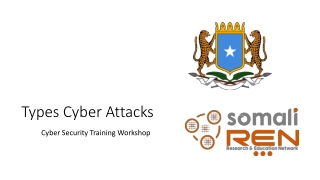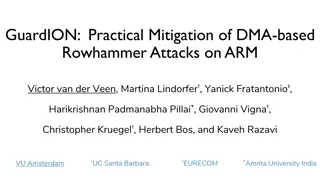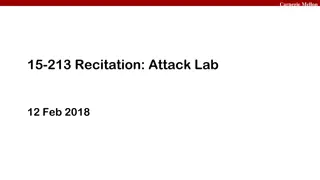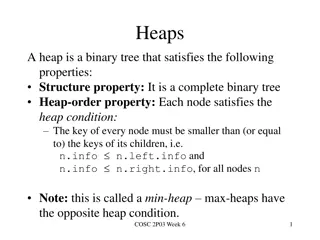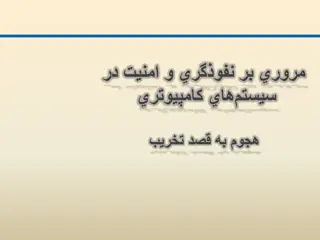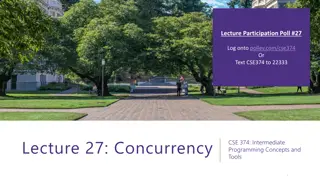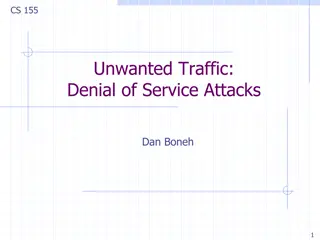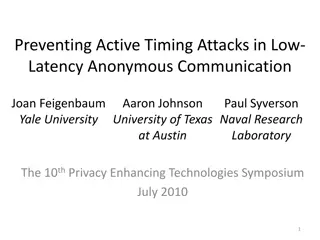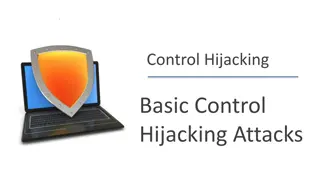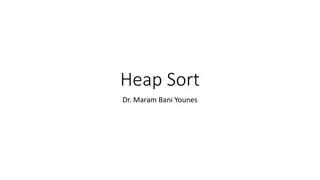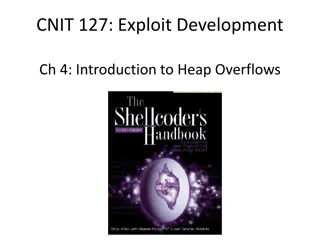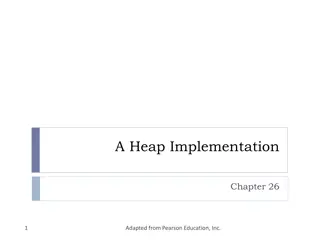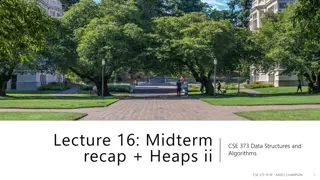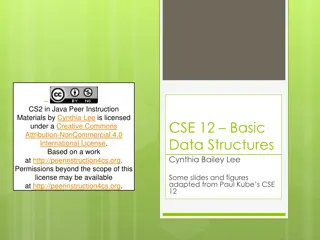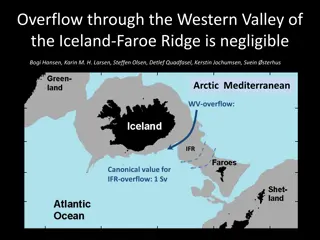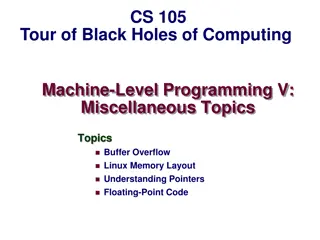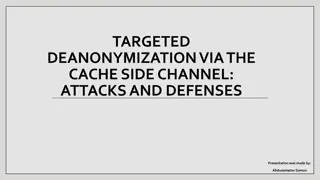Understanding Heap Overflow Attacks
A heap is a collection of variable-size memory chunks managed by the program. Heap overflow attacks occur when malicious actors corrupt heap memory, potentially allowing them to overwrite data and execute arbitrary code. This poses a significant security risk. The process involves manipulating heap metadata, such as buffer overflows leading to memory corruption and potential system compromise. Preventing heap overflow attacks requires robust memory management practices and awareness of security vulnerabilities.
Download Presentation

Please find below an Image/Link to download the presentation.
The content on the website is provided AS IS for your information and personal use only. It may not be sold, licensed, or shared on other websites without obtaining consent from the author. Download presentation by click this link. If you encounter any issues during the download, it is possible that the publisher has removed the file from their server.
E N D
Presentation Transcript
What is a heap? Heap is a collection of variable-size memory chunks allocated by the program e.g., malloc(), free() in C, creating a new object in Java creating a new object in Java script Heap management system controls the allocation, de-allocation, and reclamation of memory chunks. To do this some meta data is necessary for book- keeping 2
Heap overflow attacks What if heap memory is corrupted? If a buffer is allocated on the heap and overflown, we could overwrite the heap meta data This can allow us to modify any memory location with any value of our chosen This could lead to running arbitrary code 3
Doug Leas malloc and free P == 1: previous chunk is in use P == 0: previous chunk is free Size includes the first two control words 4
Double-linked free chunk list struct chunk { int prev_size; int size; struct chunk *fd; struct chunk *bk; }; 5
heap.c #define BUFSIZE 128 int main(int argc, char *argv[]) { char *a, *b, *c; if(argc < 2) { printf("Usage: %s <buffer>\n", argv[0]); exit(-1); } a = (char *) malloc(BUFSIZE); b = (char *) malloc(BUFSIZE+16); c = (char *) malloc(BUFSIZE+32); printf("address of a: %p\n", a); printf("address of b: %p\n", b); printf("address of c: %p\n", c); strcpy(b, "BBBBBBBBBBBBBBBBBBBBBBBBBBBBBBBBBBBBBBBB"); strcpy(c, "CCCCCCCCCCCCCCCCCCCCCCCCCCCCCCCCCCCCC"); strcpy(a, argv[1]); free(a); free(b); free(c); } 6
The heap in memory bin_forward bin_back prev_free_size=0 Size=0x88 Data (AAAAAAAAAAAAAAAAA AAAA) 1 char *a free(a) prev_free_size=0 Size=0x98 Data (BBBBBBBBBBBBBBBBB BBBBB) 1 char *b prev_free_size=0 Size=0xa8 Data (CCCCCCCCCCCCCCCC CCCCC) 1 char *c 7
After free(a) bin_forward bin_back prev_free_size=0 Size=0x88 1 char *a free(a) forward back prev_free_size=0x88 Size=0x98 Data (BBBBBBBBBBBBBBBBB BBBBB) 0 char *b free(b) prev_free_size=0 Size=0xa8 Data (CCCCCCCCCCCCCCCC CCCCC) 1 char *c 8
After free(b) bin_forward bin_back prev_free_size=0 Size=0x120 1 char *a free(a) forward back char *b free(b) prev_free_size=0x120 Size=136 Data (CCCCCCCCCCCCCCCC CCCCC) 0 char *c 9
What if b was freed first? bin_forward bin_back prev_free_size=0 Size=0x88 Data (AAAAAAAAAAAAAAAAA AAAA) 1 char *a free(a) prev_free_size=0 Size=0x98 forward back 1 char *b free(b) prev_free_size=0x98 Size=0xa8 Data (CCCCCCCCCCCCCCCC CCCCC) 0 char *c 10
Then a was freed bin_forward bin_back prev_free_size=0 Size=0x120 1 char *a forward back char *b prev_free_size=0x120 Size=0xa8 Data (CCCCCCCCCCCCCCCC CCCCC) 0 char *c 11
Key Observation When the chunk (A) to be free ed is followed by a free chunk (B), chunk B will be unlinked from the free list, and A will be inserted into the free list. If the heap meta data in B has been corrupted, the unlink operation will be dangerous. Why? 12
Remove a chunk from the double-linked free list unlink(P) P->fd->bk = P->bk; P->bk->fd = P->fd; Will create some trouble for us P forward forward forward back back back If the bk pointer is corrupted, we can control what value to put into the memory cell Overwrite the back field with what . If the fd pointer is corrupted, we can control which memory cell to be modified Overwrite the forward field with where-12 . 13
A heap overflow attack Overwrite a heap memory chunk by running past the allocated space. Create a fake heap structure that pretends to be a free chunk. When the current chunk is free() d, an arbitrary memory overwrite will occur. We can control the where and what of the memory overwrite. 14
The where By modifying certain memory locations, we can modify the EIP and make it point to injected malicious code. The Global Offset Table (GOT) contains the entry addresses of dynamically linked library functions (e.g. printf, malloc, free, exit, strcpy, etc.) We can overwrite a GOT entry that will likely be used by the program OFFSET TYPE VALUE 0804975c R_386_GLOB_DAT __gmon_start__ 08049744 R_386_JUMP_SLOT malloc 08049748 R_386_JUMP_SLOT __libc_start_main 0804974c R_386_JUMP_SLOT printf 08049750 R_386_JUMP_SLOT exit 08049754 R_386_JUMP_SLOT free 08049758 R_386_JUMP_SLOT strcpy $ objdump -R heap heap: file format elf32-i386 DYNAMIC RELOCATION RECORDS 15
The what The what will be the address of the malicious code we injected into the buffer. But, P->bk->fd=P->fd will puncture our shellcode from bytes 8-12. Thus the shell code must jump over this hole. 16
Remove a chunk from the double-linked free list unlink(P) P->fd->bk = P->bk; P->bk->fd = P->fd; Will create some trouble for us P forward forward forward back back back If the bk pointer is corrupted, we can control what value to put into the memory cell Overwrite the back field with what . If the fd pointer is corrupted, we can control which memory cell to be modified Overwrite the forward field with where-12 . 17
How to make free() think the chunk after a is free prev_free_size=0 Size=0x88 Data (AAAAAAAAAAAAAAAAA AAAA) 1 char *a prev_free_size=0 Size=0x98 Data (BBBBBBBBBBBBBBBBB BBBBB) 1 char * b prev_free_size=0x98 Size=0xa8 Data (CCCCCCCCCCCCCCCC CCCCC) The second next chunk s size word shall be an even number 0 char *c 18
Assembled heap-overflow payload buffer XXXX YYYY This word will be overwritten by the second part of unlink statement nop, nop, jmp + 4 \x90\x90\x90\x90 ZZZZ Shellcode Shellcode fake heap structure Padding 0xffffffff (-1) GOT_entry - 12 0xffffffff (-1) buffer + 8 19


